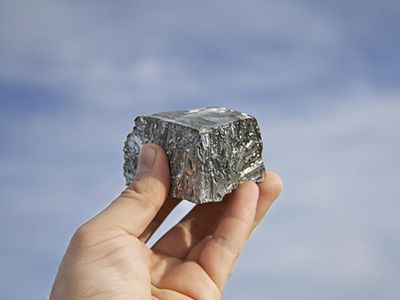Dr. Pamela's Blog
Zinc and the Stress Response
Zinc is bluish-silvery metal that our bodies require to function in very small or trace amounts. Zinc is a cofactor in over 200 enzymatic reactions in our bodies.1 This means that zinc is like the ball at the tip of a pen if you’re trying to write a letter. It’s not something you really see or think about, but without it, the ink doesn’t flow and no words are visible. We often think of zinc in regards to the immune system and wound healing, but in this blog we’re going to focus on the role of zinc in the stress response and its relationship to cortisol.

What is Cortisol?
Cortisol is one of the leading hormones in the stress response, especially with chronic stress. However, it’s important to remember that even when we’re not stressed, cortisol plays a key regulatory role in healthy physiology. In fact, we have a daily cortisol rhythm in our body that sets the stage for our day.2 One of cortisol’s primary jobs is blood sugar regulation—when blood sugar drops, cortisol rises. During the night as we sleep and are not consuming calories, blood sugar slowly starts to decline and cortisol starts to increase. Cortisol continues to rise to its highest peak of our day, generally between 6-8 am. Its job is to wake us up so that we can forage for food and increase our blood sugar. In this way, cortisol is essentially our body’s own internal alarm clock.
In Chinese medicine, these morning hours are called wood time, and it is thought to be our most creative and industrious time of the day. The natural flow of cortisol is to decrease somewhere between 1-3 pm, hitting a trough. This is the time where so many cultures take a short rest or siesta, which follows the natural rhythm of the body. As a side note, if your adrenals are fatigued, providing a small rest during this quiet time allows for the adrenal glands to recoup in a really deep way. It doesn’t need to be a full sleep, just 15-20 minutes of ease, or as my grandma used to call it “just resting her eyes.” We get a second, much smaller peak in the evening hours usually between 5-7 pm and then cortisol falls to its lowest point between 9-11 pm. This is the time when it is easiest to fall asleep, and the time slept is particularly rejuvenating.
What I often find in my practice is that patients who have been under constant chronic stress lose their natural cortisol rhythm. It becomes difficult to rise in the morning, with fatigue as a constant theme throughout the day, but then it is frustratingly hard to fall asleep in the evening. When I measure cortisol levels, I find decreased cortisol amounts in the morning when it should be high, and elevated cortisol in the evening, when it should be low.

So how does zinc fit in to all this talk about cortisol?
I recently came across an interesting research study that showed a short term decrease of cortisol levels by zinc supplementation in doses as low as 25 mg.3 Since finding this research, I have been coaching all of my patients to take their zinc in the evening, and have found that there has been a corresponding ease in falling asleep. Additionally, since zinc is required for cellular restoration, DNA repair and wound healing4, and our bodies do most of this work at night when cortisol is low, it’s a good time to have more zinc available through supplementation—especially since we don’t store zinc like other minerals and vitamins5.
Chronic stress causes overall cortisol levels to rise. High cortisol levels are associated with many of the chronic diseases that we are faced with today, such as Alzheimers6, heart disease7, diabetes8 and even cancer.9 Consistent supplementation of 25 to 30 mg zinc stabilizes cortisol levels over time.10

We often associate chronic stress with depression, and research demonstrates zinc’s ability to alleviate feelings of depression in both mouse and human studies.11-14 One of the reasons for this is because persistently elevated cortisol levels leads to a hyperactivity in the hypothalamic-pituitary-adrenal (HPA) axis, which has been shown to create depression.15,16
We already know that zinc acts to normalize cortisol levels. However, zinc also plays a direct role on brain physiology17—it is the second highest metal found in the brain after iron.18 Zinc ions play an important role in neurotransmission (one nerve talking to the next). Zinc levels are seen to rise dramatically in the synaptic space between two neurons, or nerve cells, during neural transmission. Zinc also acts as a cofactor to stabilize the vesicular storage of neurotransmitters such as glutamate.19 and is important in many ligand-and voltage -gated ion channels.20
Recent studies have linked zinc dependent proteins (GPR39) with the synthesis of seratonin21 and receptor signaling.22 Zinc has been shown to encourage neurogenesis, or growth and development of new brain cells and inhibit neuronal death23. In mouse studies, Zinc also encourages neuronal plasticity24, which is how fluid and flexible the brain is. The takeaway from all this research is zinc helps neurotransmitters work effectively and is important for the brain to be able to function both normally and even optimally.
We have already discussed that one of cortisol’s main function is to increase blood sugar. So, it isn’t surprising that chronically elevated cortisol levels will lead to chronically elevated blood sugar levels. Interestingly, zinc has positive effects on diabetes in addition to its role in normalizing cortisol levels. Zinc ions are essential for the production and storage of insulin.25 Emerging research highlights zinc’s role in maintaining insulin sensitivity, which is so critical in Type II Diabetes.26 Large longitudinal studies have shown significant decrease of disease progression from pre-diabetes or syndrome x to full blown diabetes.27 Zinc supplementation has been shown to reduce blood glucose, improve insulin resistance, improve B-cell function, and had beneficial effects on total cholesterol and LDL-C.28

Finally, we must consider the effect of cortisol on zinc levels, and what we see is that prolonged stress actually decreases the concentration of zinc in the blood.29 This has both to do with cortisol downregulating zinc concentrations, as well as the increased need and therefore utilization of existing zinc levels. Again, since we don’t have a storage form for zinc, we need to have constant and consistent ingestion.
The best food sources of zinc are red meat, oysters, crab, nuts, and seeds. Legumes are also a good source of zinc, but like many other vegetables are high in phytates which block zinc absorption. Sprouting and soaking legumes will increase the bioavailability of zinc. Additionally, zinc levels in food will correlate with zinc levels present in both soil and feed for animal sources, which unfortunately is often low. Therefore, it is prudent to consider daily supplementation with zinc, preferably in the evening before bed.
References
- Sandstead HH. Understanding zinc: recent observations and interpretations. J Lab Clin Med. 1994;124(3):322‐327
- van Campen JS, Valentijn FA, Jansen FE, Joëls M, Braun KP. Seizure occurrence and the circadian rhythm of cortisol: a systematic review. Epilepsy Behav. 2015;47:132‐137. doi:10.1016/j.yebeh.2015.04.071
- Brandão-Neto J, de Mendonça BB, Shuhama T, Marchini JS, Pimenta WP, Tornero MT. Zinc acutely and temporarily inhibits adrenal cortisol secretion in humans. A preliminary report. Biol Trace Elem Res. 1990;24(1):83‐89. doi:10.1007/BF02789143
- Kogan S, Sood A, Garnick MS. Zinc and Wound Healing: A Review of Zinc Physiology and Clinical Applications. Wounds. 2017;29(4):102‐106.
- Maret W, Sandstead HH. Zinc requirements and the risks and benefits of zinc supplementation. J Trace Elem Med Biol. 2006;20(1):3-18
- Machado A, Herrera AJ, de Pablos RM, et al. Chronic stress as a risk factor for Alzheimer's disease. Rev Neurosci. 2014;25(6):785‐804. doi:10.1515/revneuro-2014-0035
- Yao BC, Meng LB, Hao ML, Zhang YM, Gong T, Guo ZG. Chronic stress: a critical risk factor for atherosclerosis. J Int Med Res. 2019;47(4):1429‐1440. doi:10.1177/0300060519826820
- Madhu SV, Siddiqui A, Desai NG, Sharma SB, Bansal AK. Chronic stress, sense of coherence and risk of type 2 diabetes mellitus. Diabetes Metab Syndr. 2019;13(1):18‐23. doi:10.1016/j.dsx.2018.08.004
- Zeitzer JM, Nouriani B, Rissling MB, et al. Aberrant nocturnal cortisol and disease progression in women with breast cancer. Breast Cancer Res Treat. 2016;158(1):43‐50. doi:10.1007/s10549-016-3864-2
- Faure H, Peyrin JC, Richard MJ, Favier A. Parenteral supplementation with zinc in surgical patients corrects postoperative serum-zinc drop. Biol Trace Elem Res. 1991;30(1):37‐45. doi:10.1007/BF02990340
- Solati Z, Jazayeri S, Tehrani-Doost M, Mahmoodianfard S, Gohari MR. Zinc monotherapy increases serum brain-derived neurotrophic factor (BDNF) levels and decreases depressive symptoms in overweight or obese subjects: a double-blind, randomized, placebo-controlled trial. Nutr Neurosci. 2015;18(4):162‐168. doi:10.1179/1476830513Y.0000000105
- Li Z, Wang W, Xin X, Song X, Zhang D. Association of total zinc, iron, copper and selenium intakes with depression in the US adults. J Affect Disord. 2018;228:68‐74. doi:10.1016/j.jad.2017.12.004
- Tassabehji, N.M.; Corniola, R.S.; Alshingiti, A.; Levenson, C.W. Zinc deficiency induces depression-like symptoms in adult rats. Physiol. Behav. 2008, 95, 365–369
- Amani, R.; Saeidi, S.; Nazari, Z.; Nematpour, S. Correlation between dietary zinc intakes and its serum levels with depression scales in young female students. Biol. Trace Elem. Res. 2010, 137, 150–158
- Jokinen, J.; Nordström, P. HPA axis hyperactivity and attempted suicide in young adult mood disorder inpatients. J. Affect. Disord. 2009, 116, 117–120
- Pariante, C.M.; Lightman, S.L. The HPA axis in major depression: Classical theories and new developments. Trends Neurosci. 2008, 31, 464–468
- Wang J, Um P, Dickerman BA, Liu J. Zinc, Magnesium, Selenium and Depression: A Review of the Evidence, Potential Mechanisms and Implications. Nutrients. 2018;10(5):584. Published 2018 May 9. doi:10.3390/nu10050584
- Huang EP. Metal ions and synaptic transmission: think zinc. Proc Natl Acad Sci U S A. 1997;94(25):13386‐13387. doi:10.1073/pnas.94.25.13386
- Huang EP. Metal ions and synaptic transmission: think zinc. Proc Natl Acad Sci U S A. 1997;94(25):13386‐13387. doi:10.1073/pnas.94.25.13386
- Marchetti, C. Interaction of metal ions with neurotransmitter receptors and potential role in neurodiseases. Biometals 2014, 27, 1097–1113.
- Młyniec, K.; Gaweł, M.; Librowski, T.; Reczy ´nski, W.; Bystrowska, B.; Holst, B. Investigation of the GPR39 zinc receptor following inhibition of monoaminergic neurotransmission and potentialization of glutamatergic neurotransmission. Brain Res. Bull. 2015, 115, 23–29
- Tena-Campos, M.; Ramon, E.; Borroto-Escuela, D.O.; Fuxe, K.; Garriga, P. The zinc binding receptor GPR39 interacts with 5-HT1A and GalR1 to form dynamic heteroreceptor complexes with signaling diversity. Biochim. Biophys. Acta Mol. Basis Dis. 2015, 1852, 2585–2592
- Gao, H.-L.; Zheng, W.; Xin, N.; Chi, Z.-H.; Wang, Z.-Y.; Chen, J.; Wang, Z.-Y. Zinc deficiency reduces neurogenesis accompanied by neuronal apoptosis through caspase-dependent and-independent signaling pathways. Neurotox. Res. 2009, 16, 416–425
- Pfaender, S.; Föhr, K.; Lutz, A.-K.; Putz, S.; Achberger, K.; Linta, L.; Liebau, S.; Boeckers, T.M.; Grabrucker, A.M. Cellular zinc homeostasis contributes to neuronal differentiation in human induced pluripotent stem cells. Neural Plast. 2016, 2016
- Chabosseau P, Rutter GA. Zinc and diabetes. Arch Biochem Biophys. 2016;611:79‐85. doi:10.1016/j.abb.2016.05.022
- Norouzi S, Adulcikas J, Sohal SS, Myers S. Zinc transporters and insulin resistance: therapeutic implications for type 2 diabetes and metabolic disease. J Biomed Sci. 2017;24(1):87. Published 2017 Nov 20. doi:10.1186/s12929-017-0394-0
- Fernández-Cao JC, Warthon-Medina M, H Moran V, et al. Zinc Intake and Status and Risk of Type 2 Diabetes Mellitus: A Systematic Review and Meta-Analysis. Nutrients. 2019;11(5):1027. Published 2019 May 8. doi:10.3390/nu11051027
- Ranasinghe P, Wathurapatha WS, Galappatthy P, Katulanda P, Jayawardena R, Constantine GR. Zinc supplementation in prediabetes: A randomized double-blind placebo-controlled clinical trial. J Diabetes. 2018;10(5):386‐397. doi:10.1111/1753-0407.12621
- Córdova A, Navas FJ. Effect of training on zinc metabolism: changes in serum and sweat zinc concentrations in sportsmen. Ann Nutr Metab. 1998;42(5):274-82


